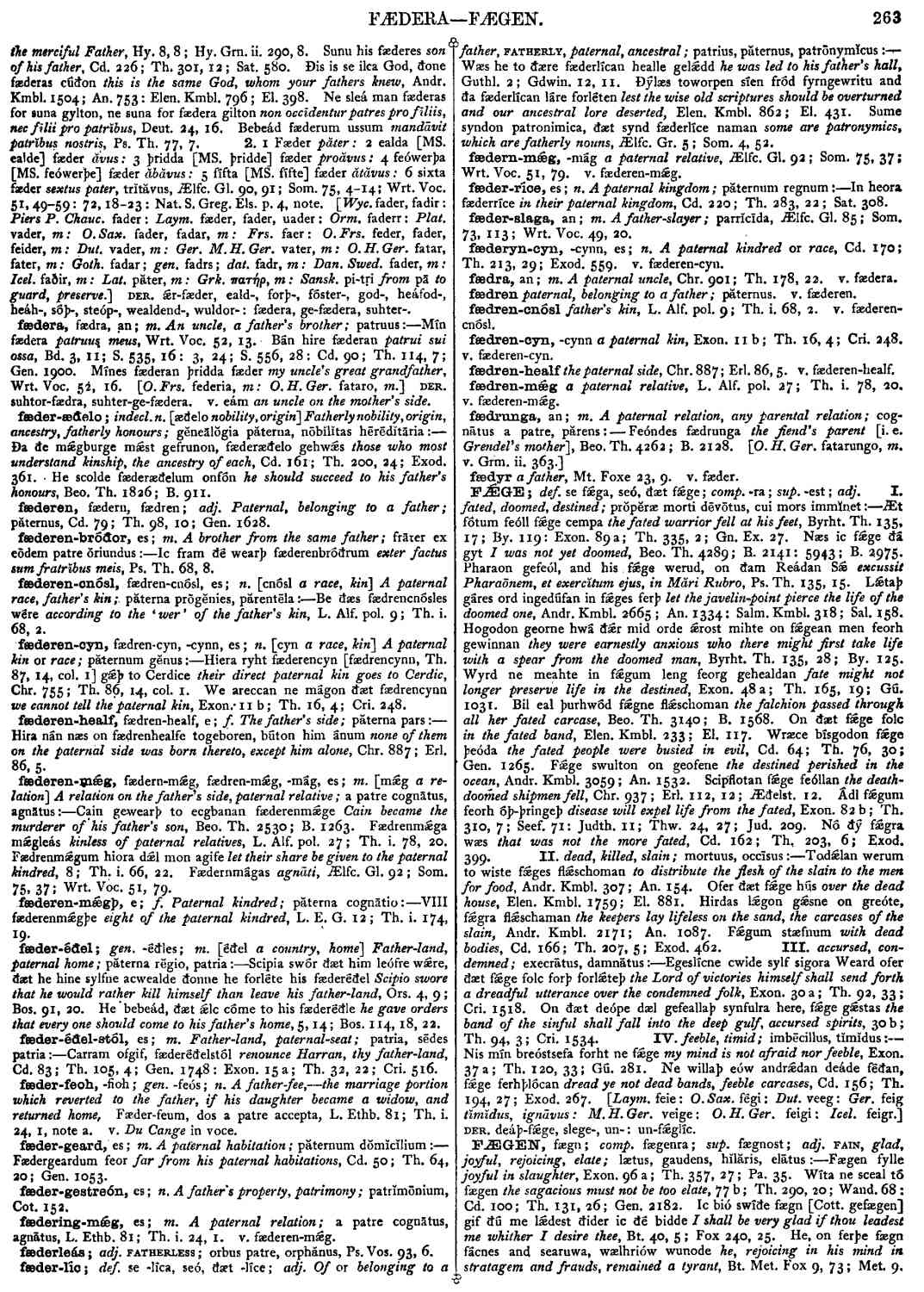FǼGE
- adjective
-
Æt fótum feóll fǽge cempa
the fated warrior fell at his feet,
- Byrht. Th. 135, 17;
- By. 119 : Exon. 89 a ;
- Th. 335, 2;
- Gn. Ex. 27 .
-
Næs ic fǽge ðá gyt
I was not yet doomed,
- Beo. Th. 4289 ;
- B. 2141 : 5943 ;
- B. 2975 .
-
Pharaon gefeól, and his fǽge werud, on ðam Reádan Sǽ
excussit Pharaōnem, et exercĭtum ejus, in Mări Rubro,
- Ps. Th. 135, 15.
-
Lǽtaþ gáres ord ingedúfan in fǽges ferþ
let the javelin-point pierce the life of the doomed one,
- Andr. Kmbl. 2665 ;
- An. 1334 : Salm. Kmbl. 318 ;
- Sal. 158 .
-
Hogodon georne hwá ðǽr mid orde ǽrost mihte on fǽgean men feorh gewinnan
they were earnestly anxious who there might first take life with a spear from the doomed man,
- Byrht. Th. 135, 28;
- By. 125 .
-
Wyrd ne meahte in fǽgum leng feorg gehealdan
fate might not longer preserve life in the destined,
- Exon. 48 a ;
- Th. 165, 19;
- Gú. 1031 .
-
Bil eal þurhwód fǽgne flǽschoman
the falchion passed through all her fated carcase,
- Beo. Th. 3140 ;
- B. 1568 .
-
On ðæt fǽge folc
in the fated band,
- Elen. Kmbl. 233 ;
- El. 117 .
-
Wræce bísgodon fǽge þeóda
the fated people were busied in evil,
- Cd. 64 ;
- Th. 76, 30;
- Gen. 1265 .
-
Fǽge swulton on geofene
the destined perished in the ocean,
- Andr. Kmbl. 3059 ;
- An. 1532 .
-
Scipflotan fǽge feóllan
the death-doomed shipmen fell,
- Chr. 937 ;
- Erl. 112, 12;
- Æðelst. 12 .
-
Ádl fǽgum feorh óþ-þringeþ
disease will expel life from the fated,
- Exon. 82 b ;
- Th. 310, 7;
- Seef. 71 : Judth. 11 ;
- Thw. 24, 27;
- Jud. 209 .
-
Nó ðý fǽgra wæs
that was not the more fated,
- Cd. 162 ;
- Th, 203, 6;
- Exod. 399 .
-
Todǽlan werum to wiste fǽges flǽschoman
to distribute the flesh of the slain to the men for food,
- Andr. Kmbl. 307 ;
- An. 154 .
-
Ofer ðæt fǽge hús
over the dead house,
- Elen. Kmbl. 1759 ;
- El. 881 .
-
Hirdas lǽgon gǽsne on greóte, fǽgra flǽschaman
the keepers lay lifeless on the sand, the carcases of the slain,
- Andr. Kmbl. 2171 ;
- An. 1087 .
-
Fǽgum stæfnum
with dead bodies,
- Cd. 166 ;
- Th. 207, 5;
- Exod. 462 .
-
Egeslícne cwide sylf sigora Weard ofer ðæt fǽge folc forþ forlǽteþ
the Lord of victories himself shall send forth a dreadful utterance over the condemned folk,
- Exon. 30 a ;
- E Th. 92, E33;
- E Cri. 1518 E.
-
On ðæt deópe dæl gefeallaþ synfulra here, fǽge gǽstas
the band of the sinful shall fall into the deep gulf, accursed spirits,
30 b;- Th. 94, 3;
- Cri. 1534 .
-
Nis mín breóstsefa forht ne fǽge
my mind is not afraid nor feeble,
- Exon. 37 a; Th. 120, 33; Gú. 281.
-
Ne willaþ eów andrǽdan deáde féðan, fǽge ferhþlócan
dread ye not dead bands, feeble carcases,
- Cd. 156; Th. 194, 27; Exod. 267.
Bosworth, Joseph. “FǼGE.” In An Anglo-Saxon Dictionary Online, edited by Thomas Northcote Toller, Christ Sean, and Ondřej Tichy. Prague: Faculty of Arts, Charles University, 2014. https://bosworthtoller.com/9909.
Checked: 1